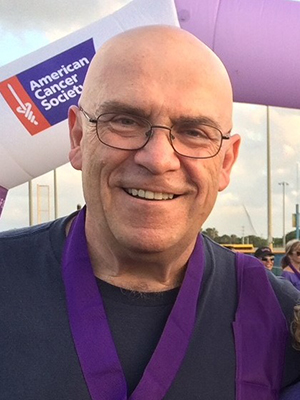
Michael Gavaghen. Photo courtesy of Michael Gavaghen
JUST AS PEOPLE LEARN unexpected things about themselves when they have cancer, they also learn a lot about human behavior from friends and family members who offer their help. When I was in the hospital being treated with chemotherapy for an aggressive non-Hodgkin lymphoma, I was thankful for visitors who raised my spirits and helped me to forget I was sick, often by sharing a good laugh or a mutual pastime. However, some exchanges in those six months of treatment had the opposite effect.
It’s not easy to know exactly what to say when visiting someone who is facing a serious illness, but the odds that you can be a calming force improve if you focus on the familiar: The interests you share—work, family, sports, gossip or the latest episode of Game of Thrones—are good starting points. Even so, it’s hard to avoid saying the wrong thing during a hospital visit. Here are some examples of questions and statements to stay away from.
“Are you throwing up all the time?”
Eventually, I answered this question and all questions about how I was reacting to chemo or how I was feeling in general with one-word answers that gave the impression I was fine. I wasn’t fine really, but no one wanted to hear the specifics of my nausea or neuropathy. However, friends who launched into discussions about their kids or our favorite sport helped me focus on something else.
“Is this a bad cancer?”
At first, I mistook questions about my prognosis as an invitation to share my newfound cancer knowledge. I would launch into an explanation of how diffuse large B-cell lymphoma differed from Burkitt lymphoma and watch my friends slide off their chairs into a deep sleep. I finally learned to respond by downplaying my cancer and reassuring people I couldn’t be better. This caused a strange reversal of roles: I, the patient, was comforting the visitor. Every cancer survivor I know has experienced the same phenomenon. Friends and family members who visit can make it easier for everyone by steering clear of questions about our prognosis unless we bring it up.
“Have you tried this [insert alternative treatment]?”
Typically, cancer patients do their homework before deciding on a treatment. We join online cancer communities, subscribe to oncology forums and become Google experts on all issues related to our cancer. We often seek out second and even third opinions. Once we agree to a course of treatment, we live in constant doubt and fear. We won’t know if we made the right choice until much later, and there’s no hedging bets once we’re wheeled into surgery or begin a chemotherapy regimen. The last thing we need when we’re feeling weak and vulnerable is to hear about someone else’s plan B.
“That wig looks really natural.” Or, “You look good without hair.”
To be honest, compliments about my baldness didn’t bother me because I happen to look amazing without hair. But my wife, who was treated twice for breast cancer, found these remarks insincere. Worse, they focused her attention on the negative. Most of us don’t comment on the day-to-day physical appearance of our loved ones, even when they’re having a bad hair day. Why would we deviate from appropriate restraint when one of those friends is fighting cancer? Instead, simply tell friends in treatment how great it is to see them. It focuses on the positive and has the added benefit of being true.
“This probably wouldn’t have happened if you did [insert any healthy activity].”
Early on, I blamed my cancer on a sedentary lifestyle, a fondness for beer, a white-collar job, an affinity for red meat and coffee, too much stress, not enough sleep, and a really bad sunburn from 1971. None of us can know if any of these behaviors or vices caused my cancer. In fact, people who “do everything right” get cancer all the time. Pointing out behaviors that might have led to cancer does nothing more than shame the patient, who already may be feeling a disproportionate amount of culpability for their diagnosis.
“Both of my parents died of cancer.”
I still grapple with this statement made by one of my nurses. I can only imagine she was trying to convey that she understood the severity of my diagnosis. Of course, when someone we know has cancer, we think of others we know who also had cancer. But if you’re going for an empathetic vibe, leave out the part about other cancer patients dying.
“Treatment was so much harder when [insert yourself or a loved one] had cancer.”
You may be trying to help us look on the bright side, but comparisons can sound callous or even competitive. Do you really want us to feel grateful for the timing of our cancer? Before talking about someone else’s experiences with cancer, think about whether sharing that story will help the person who is sick now. Remember, even though some treatment protocols have fewer side effects, having to go through any kind of treatment still stinks. In fact, it’s perfectly fine to say, “This really sucks,” and leave it at that. Because it does. And we appreciate that you recognize it.
It’s also OK to admit you’re having trouble finding the right words. You can never go wrong with, “I’m not sure what to say here, except I’m glad we were able to get together,” or, “We can talk about whatever is on your mind. And if you need to vent, I’m your guy.” And then listen.
Because what you say is always less important than how well you listen.
Cancer Today magazine is free to cancer patients, survivors and caregivers who live in the U.S. Subscribe here to receive four issues per year.





